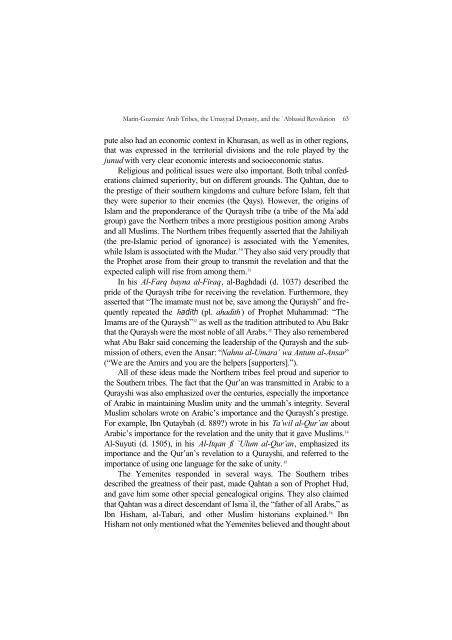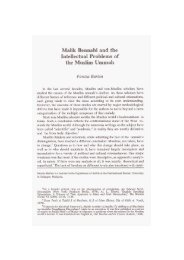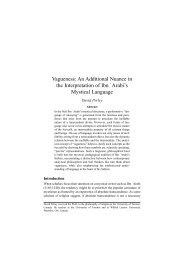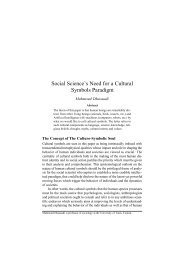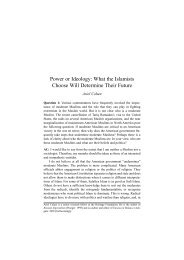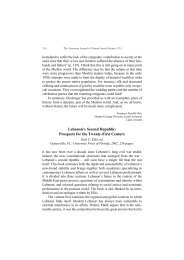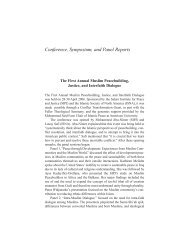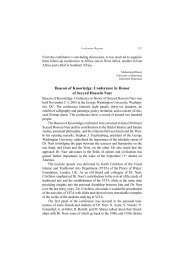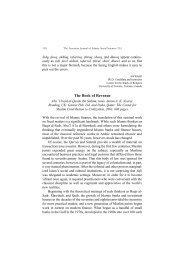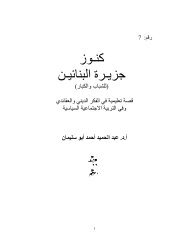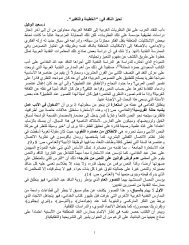Arab Tribes, the Umayyad Dynasty, and the `Abbasid ... - Epistemology
Arab Tribes, the Umayyad Dynasty, and the `Abbasid ... - Epistemology
Arab Tribes, the Umayyad Dynasty, and the `Abbasid ... - Epistemology
Create successful ePaper yourself
Turn your PDF publications into a flip-book with our unique Google optimized e-Paper software.
Marín-Guzmán: <strong>Arab</strong> <strong>Tribes</strong>, <strong>the</strong> <strong>Umayyad</strong> <strong>Dynasty</strong>, <strong>and</strong> <strong>the</strong> <strong>`Abbasid</strong> Revolution 63<br />
pute also had an economic context in Khurasan, as well as in o<strong>the</strong>r regions,<br />
that was expressed in <strong>the</strong> territorial divisions <strong>and</strong> <strong>the</strong> role played by <strong>the</strong><br />
junud with very clear economic interests <strong>and</strong> socioeconomic status.<br />
Religious <strong>and</strong> political issues were also important. Both tribal confederations<br />
claimed superiority, but on different grounds. The Qahtan, due to<br />
<strong>the</strong> prestige of <strong>the</strong>ir sou<strong>the</strong>rn kingdoms <strong>and</strong> culture before Islam, felt that<br />
<strong>the</strong>y were superior to <strong>the</strong>ir enemies (<strong>the</strong> Qays). However, <strong>the</strong> origins of<br />
Islam <strong>and</strong> <strong>the</strong> preponderance of <strong>the</strong> Quraysh tribe (a tribe of <strong>the</strong> Ma`add<br />
group) gave <strong>the</strong> Nor<strong>the</strong>rn tribes a more prestigious position among <strong>Arab</strong>s<br />
<strong>and</strong> all Muslims. The Nor<strong>the</strong>rn tribes frequently asserted that <strong>the</strong> Jahiliyah<br />
(<strong>the</strong> pre-Islamic period of ignorance) is associated with <strong>the</strong> Yemenites,<br />
while Islam is associated with <strong>the</strong> Mudar. 30 They also said very proudly that<br />
<strong>the</strong> Prophet arose from <strong>the</strong>ir group to transmit <strong>the</strong> revelation <strong>and</strong> that <strong>the</strong><br />
expected caliph will rise from among <strong>the</strong>m. 31<br />
In his Al-Farq bayna al-Firaq, al-Baghdadi (d. 1037) described <strong>the</strong><br />
pride of <strong>the</strong> Quraysh tribe for receiving <strong>the</strong> revelation. Fur<strong>the</strong>rmore, <strong>the</strong>y<br />
asserted that “The imamate must not be, save among <strong>the</strong> Quraysh” <strong>and</strong> frequently<br />
repeated <strong>the</strong> hadith (pl. ahadith) of Prophet Muhammad: “The<br />
Imams are of <strong>the</strong> Quraysh” 32 as well as <strong>the</strong> tradition attributed to Abu Bakr<br />
that <strong>the</strong> Quraysh were <strong>the</strong> most noble of all <strong>Arab</strong>s. 33 They also remembered<br />
what Abu Bakr said concerning <strong>the</strong> leadership of <strong>the</strong> Quraysh <strong>and</strong> <strong>the</strong> submission<br />
of o<strong>the</strong>rs, even <strong>the</strong> Ansar: “Nahnu al-Umara’ wa Antum al-Ansar”<br />
(“We are <strong>the</strong> Amirs <strong>and</strong> you are <strong>the</strong> helpers [supporters].”).<br />
All of <strong>the</strong>se ideas made <strong>the</strong> Nor<strong>the</strong>rn tribes feel proud <strong>and</strong> superior to<br />
<strong>the</strong> Sou<strong>the</strong>rn tribes. The fact that <strong>the</strong> Qur’an was transmitted in <strong>Arab</strong>ic to a<br />
Qurayshi was also emphasized over <strong>the</strong> centuries, especially <strong>the</strong> importance<br />
of <strong>Arab</strong>ic in maintaining Muslim unity <strong>and</strong> <strong>the</strong> ummah’s integrity. Several<br />
Muslim scholars wrote on <strong>Arab</strong>ic’s importance <strong>and</strong> <strong>the</strong> Quraysh’s prestige.<br />
For example, Ibn Qutaybah (d. 889?) wrote in his Ta’wil al-Qur’an about<br />
<strong>Arab</strong>ic’s importance for <strong>the</strong> revelation <strong>and</strong> <strong>the</strong> unity that it gave Muslims. 34<br />
Al-Suyuti (d. 1505), in his Al-Itqan fi `Ulum al-Qur’an, emphasized its<br />
importance <strong>and</strong> <strong>the</strong> Qur’an’s revelation to a Qurayshi, <strong>and</strong> referred to <strong>the</strong><br />
importance of using one language for <strong>the</strong> sake of unity. 35<br />
The Yemenites responded in several ways. The Sou<strong>the</strong>rn tribes<br />
described <strong>the</strong> greatness of <strong>the</strong>ir past, made Qahtan a son of Prophet Hud,<br />
<strong>and</strong> gave him some o<strong>the</strong>r special genealogical origins. They also claimed<br />
that Qahtan was a direct descendant of Isma`il, <strong>the</strong> “fa<strong>the</strong>r of all <strong>Arab</strong>s,” as<br />
Ibn Hisham, al-Tabari, <strong>and</strong> o<strong>the</strong>r Muslim historians explained. 36 Ibn<br />
Hisham not only mentioned what <strong>the</strong> Yemenites believed <strong>and</strong> thought about


